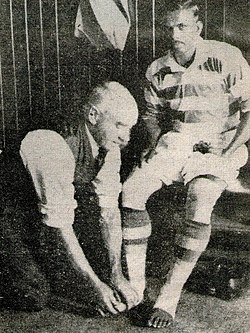Almost 50 years back, in the joyful city of Kolkata, one particular household was gloomy. Mohammad Salim, the erstwhile majestic footballer, had fallen ill. Seeing this, his son came up with a ploy. He thought of writing to Celtic Football Club, asking for money, to see whether they remembered his father. He received a bank draft of £100 from them which surprised him and his father. Celtic remembered him, football lovers of Calcutta remember him, and now, devotees of the beautiful game in the whole of India, remember him.

Let’s go back to the year 1911. Mohun Bagan was playing against Yorkshire Regiment in the IFA Shield final. And among the thousands of people watching the match was one young child, who went by the name Mohammed Salim. The result of the match had boosted the confidence and morale of all Indians, including Salim, and instilled in their minds a new-found belief that they are not inferior to the British.
Salim played for a flurry of local clubs before signing for Mohammedan FC in 1934. He acted as a master on the field as Mohammedan FC won 5 consecutive Calcutta Football League from 1934 to 1938. They also won the IFA Shield in 1936.
Now here’s where the story gets interesting. In 1936, Mohammed Salim was selected to play two exhibition matches against China. One match was of Indian XI and the other was of a civil and military team. Salim played in the first match and earned appreciation from even the Chinese official. But before the second match, Salim was nowhere to be found! Salim had disappeared and the police were looking for him. Newspapers requested him to come back and play for the military and civil team. But Salim, being the unbelievable character he was, had boarded the ship to Britain.

Salim had a relative named Hasheem, who was impressed after seeing Salim’s game. Hasheem wanted Salim to try his luck in European football and took him to Celtic Park. Hasheem spoke to Willie Maley, manager of Celtic, and requested him to take Salim’s trial, while he plays bare-foot.
Maley wasn’t sure about the idea of a player playing without boots but still gave him a chance to prove himself. Salim gave his trials in front of thousands of people and impressed everyone with his ability. He was then selected to play in two friendly matches for Scottish giants, Celtic.
The first match was against Hamilton Accies, which Celtic won 5-1. Salim scored one from a penalty and it is said that the shot was so strong that even though the goalkeeper got a hand to it, the ball went into the goal!
By then Salim started being noticed by fans and the press. Several newspapers carried out articles about him, with headlines like “Indian Juggler-New Style” arousing the interest of the local fans.
In the second match against Galston, Celtic scored 7 goals. Salim was involved in 3 goals out of those 7 and was also offered to take a penalty, which he was too shy to accept. Salim was playing with his foot bandaged but was still lethal on the pitch.

Fans could be heard chanting “Pass the ball to Salim”, to have a glimpse of the strange foreign player who came to play for them from across the oceans. Perhaps the curiosity also arose from the fact that a dark-skinned player was donning the green and white jersey, something the Europeans weren’t too accustomed to seeing back in those days.
After the two matches, Salim naturally felt homesick. He wasn’t able to stay away for his family for too long and decided to go back to India. Celtic was adamant to keep him there, and even offered him 5% of the gate revenue from a charity match arranged just for him. It was indeed a handsome amount of money but Salim didn’t realize that, and he requested them to donate that money to orphans. Reportedly, Salim also had offers from Germany. But Salim went back to India and joined Mohammedan FC just before the Calcutta Football League began in 1937.
On November 5, 1980, Salim breathed his last in his hometown. He left behind a rich legacy, which is still remembered 40 years since his death. His story is not just one of success and pride, but also of resistance to the British and an unravelling spirit of a fight to anyone who underestimated them. In a world which was dominated by colonialism, Salim managed to make a mark and prove to everyone that the colour of his skin didn’t make him weak, it only made him stronger. And even today, Indian football fans remember him, and wonder to themselves, what could have transpired, had Salim stayed at Celtic.


